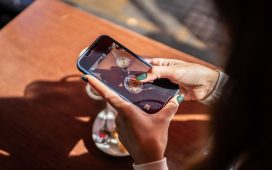Illustration by Julian Glander
The Thanksgiving table can be an emotional battlefield. Whether because of resurfaced sibling rivalry, blended-family tensions or mealtime political debate, the togetherness that we hope will inspire gratitude is notorious for causing stress instead. One subtle insult or off-color comment from a relative, and it begins: You feel your blood pressure rising, your palms sweating, your face getting hot. Suddenly you’re inhaling the sliver of pumpkin pie you’d just been picking at a minute ago. Next, you’re going back for a second big slice. Your stomach already feels full, but you can’t stop eating.
If you’re like many Americans, now you feel guilty. You chastise yourself for handling the difficult moment the wrong way — the “weak” way. For “eating your feelings.”
But eating emotionally, which conventional wisdom says is dysfunctional and even pathological, is actually just a normal part of being human. We don’t turn to food in response to negative feelings because we’re broken or out of control, or because food is addictive. We do it because it’s one of many ways in which we (even the most balanced eaters) cope, and in the grand scheme of things, it’s a pretty harmless one.
We should embrace eating in response to our feelings — pleasure, excitement, sadness and yes, that special brand of family-inspired stress — at Thanksgiving, and all year long.
In our body- and diet-obsessed culture, it’s a widely held belief, even among those who don’t consider themselves dieters, that it’s healthier and more righteous to eat less: fewer sweets, fewer processed foods, fewer carbohydrates (or whatever the latest fad diet prescribes), fewer foods consumed for any reason other than pure survival. In the minds of many, restriction is a sign of discipline and health. But ironically, people who are restricting their eating are actually more likely to engage in stress eating. And this behavior tends to dissipate or disappear when the deprivation stops.
We know why this is. Psychologists believe dieting puts eating under conscious cognitive control — meaning dieters exert mental effort to control their intake. (Intuitive eaters, on the other hand, get cues about when and what to eat primarily from their bodies.) Negative emotions deplete that cognitive control, breaking down the barriers that were holding dieters back from their bodies’ true desire to eat, and their appetites that were being suppressed emerge in a big way.
Not only that, but restrained eating can actually cause an increase in negative emotions. The Minnesota Starvation Experiment offers an example of how the physical deprivation created by dieting increases people’s risk of mental-health challenges. The experiment, conducted at the University of Minnesota in the 1940s, was aimed at studying the effects of starvation and re-feeding on the human body to figure out how to provide effective food aid to countries ravaged by World War II. The researchers selected a group of 36 young men whom they deemed to be exceptional models of health. The men were conscientious objectors to World War II, who had strong convictions against killing and violence. By all accounts these volunteers were well-adjusted, mature, peaceful people before they enrolled, but as the experiment progressed … not so much.
The researchers put the men on a diet that was calculated to meet a little more than half of their actual energy needs, for six months. They referred to this as a semi-starvation diet, but there was nothing “semi” about its effects. On the diet, these previously happy men became irritable, anxious, unmotivated, emotionally unpredictable and unable to concentrate. They became obsessed with food, lingering for hours over meals and making weird concoctions. Two volunteers were even kicked out of the experiment because they broke the diet — one by stealing and eating raw rutabagas and another by eating garbage scraps. Both of these men also suffered severe psychological distress and spent time in the psychiatric ward of the university hospital. These profound psychological changes, the Minnesota researchers found, were the result of restrictive eating.
More recent research has indicated that dieters — even those who wouldn’t necessarily identify as such who just watch what they eat, a phenomenon that the scientific literature calls “flexible dietary control” — are more likely to suffer from depression, low self-esteem, disordered eating and overall psychological distress than intuitive eaters, who don’t intentionally try to control their eating or weight. In one 2015 study, for example, researchers analyzed data from 382 American men and women and found that people with higher intuitive-eating scores had more positive moods, greater body appreciation and greater overall life satisfaction, and lower levels of unhappiness, binge eating and food preoccupation than those who scored higher on measures of flexible dietary control. Food deprivation of any kind seems to play a role in creating the very mental conditions that lead people to want to self-soothe with food.
I teach online courses for people who want to stop spending so much time worrying about food and their bodies. As one participant put it: “All this time, I thought I was ‘sick in the head’ as my mama would say. But NO, I was freaking starving. All those years of running kids around, hauling groceries, playing tennis, cleaning house — then trying to survive on [too little food] for breakfast and lunch. No wonder I was like a fiend by three o’clock in the afternoon!” Sometimes we can be completely convinced that we’re just “eating our feelings,” when in fact we’re eating because we’ve been depriving ourselves — we just didn’t recognize the signs.
That’s all the more reason to just start trusting the inner voice telling us to eat, rather than second-guessing it.
In fact, decades of psychological research on emotional eating have shown that it may not even be a scientifically sound concept; in experimental settings, self-identified emotional eaters don’t actually eat any more in the presence of emotional stimuli than anyone else. Instead, people who identify as emotional eaters seem to simply be people who are more worried about their eating behavior, feel they don’t have control over it, and follow external rules about “healthy eating.”
So why do so many people worry about and demonize so-called emotional eating? I attribute this attitude to what my colleagues and I in the field of disordered eating call “diet culture” — a system of beliefs that equates thinness, muscularity and particular body shapes with health and moral virtue, promotes weight loss and body reshaping as a means of attaining higher status, demonizes certain foods and food groups while elevating others and oppresses people who don’t match its supposed picture of health. Many of us are taught this way of thinking starting in childhood, setting the stage for us to to blame ourselves when diets fail and we feel totally unhinged around food, and to feel shame about any eating that is being driven by “mere emotions.”
Another reason emotional eating gets a bad rap is that people do tend to eat more sweets, starches and other demonized foods when they’re stressed out. These foods are sometimes described as being “addictive,” like cocaine. You may have heard that we just can’t control ourselves around them, because they light up the pleasure centers in our brains. But this is likely the result of restriction, not addiction. A 2016 review of the scientific literature examining so-called sugar addiction found that there’s no convincing evidence in humans to support the belief that sugar is addictive. While there are studies that find evidence of addiction-like behavior, they typically fail to consider that deprivation (via intermittently restricted access to sugar) may actually be the key driver of these behaviors. Findings from animal studies indicate that addiction-like behaviors around sugar occur only when the animals have intermittent access to sugar — not when they’re allowed to eat as much of it as they want at any time. It’s only when the animals are periodically deprived of sugar that they eat in a way that might look or feel “addictive.”
Proponents of “sugar addiction” theory often argue that highly processed food is engineered to achieve a perfect “bliss point” of sweetness that makes it supposedly irresistible to the reward centers in our brains. But research has actually shown that long-term dieters experience significantly greater activation of brain regions associated with food reward in response to sweet foods. Non-dieters’ brains seem to remain relatively unfazed by sugar.
Plus, the idea of food-related “bliss” as a bad thing is misguided. There’s nothing wrong with eating for pleasure. In fact, there’s evidence that people who let themselves eat whatever they want, enjoy food and care less about nutrition have better nutrient intake than dieters. In part, that may be because non-dieters consume a greater variety of foods (a positive nutritional indicator) than dieters.
For those who think of themselves as emotional eaters, finding additional ways to cope with difficult emotions is important, too. That’s not to say you need to stop turning to food for comfort, not at all; it’s just about adding more coping skills so that you feel better equipped to deal with life. Rather than “Go knit in a corner instead of eating,” I’d suggest, “How about you call a friend after you finish that pumpkin pie?”
At this time of year, we often hear the refrain that we should focus on the people, not the food, at holiday meals. Some even recommend eating a diet-approved snack at home before, to avoid being “tempted” by all the delicious treats that await. But that robs us of the inherent pleasure that special holiday foods can bring — during celebrations that are joyful all around and yes, on the inevitable days when we enjoy the pie more than we enjoy our relatives.
Christy Harrison is a registered dietitian nutritionist and the author of the forthcoming book “Anti-Diet: Reclaim Your Time, Money, Well-Being and Happiness Through Intuitive Eating,” from which this essay is adapted.
The Times is committed to publishing a diversity of letters to the editor. We’d like to hear what you think about this or any of our articles. Here are some tips. And here’s our email: letters@nytimes.com.
Follow The New York Times Opinion section on Facebook, Twitter (@NYTopinion) and Instagram.






